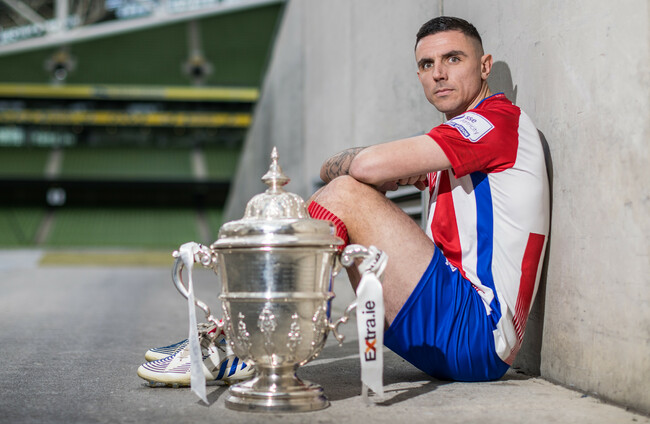THE QUESTION RAISED by Treaty United remains the same for the second-straight year.
How are they doing this?
Treaty rose to fill the void left by Limerick FC last year, granted a licence six days before the start of the First Division, leaving manager Tommy Barrett less than a week to pull a squad together.
He did exactly that and Treaty finished a remarkable fourth in the First Division, knocked out by promoted UCD in the play-off semi-finals. A year on, they are back in the play-offs once again, and added to that achievement a Cup run.
This weekend they head to the Brandywell for an FAI Cup semi-final against Derry City, one step from an improbable debut at the Aviva Stadium.
They have done it all in a First Division stacked with full-time teams and with one of the smallest budgets in the division. There are junior clubs in Limerick capable of paying an individual player more than Treaty are.
And yet here they are, fighting on both fronts in the final weeks of the season.
How are they doing this?
“The plaudits go to Tommy and his coaching staff”, says top scorer Enda Curran of his manager.
Barrett has a different answer to the same question.
“I’ve just got a good group of lads”, he says.
He does attribute some of the season’s success to keeping his strikers fit, and Curran has scored 18 goals in all competitions, including a hat-trick in the quarter-final win over UCD.
“Tommy’s man-management is the best I have seen”, says Curran. “He treats people with the utmost respect, he understands that guys have jobs and families and kids. Lads play for him as he has that level of give-and-take, and it’s shown in the results. Hopefully we can repay him with a trip to the Aviva.
“I’m 30 now. If I said to Tommy that I am sore or tired, he would understand and would have me do a recovery session, or go off and do a jog and stretch. I want to play every game but he has occasionally left me out, because a game on Friday and another on a Monday wouldn’t always suit me. It is credit to him that he can see it.”
Recovery is the area in which the differences between full-time and part-time teams are most pronounced. Full-time players can come into the training ground for a recovery session after a game, whereas Curran drove back to Galway from an away game in Wexford this season and clocked into his job with a building providers at 7.30am.
“You have to be flexible as regards when lads are working, you can’t be an authoritarian or dictator type”, says Barrett. “I always try to make it a player-led approach, without them dictating the course. It’s about the players.
“You have to treat them as people first, rather than players. You can’t, in any job, feel that the manager is trying to use you. It’s about building a team and sometimes in business and community organisations I find the team is built quicker. There are more team-building activities done and it is more personable. I had some very good managers [as a player] but my main experience was authoritative, sometimes authoritarian. The players wouldn’t have had too much of a voice. It is changing now.”
Barrett’s people-management skills have been honed outside of football. He rose to a supervisor’s role at Dell in Limerick by the age of 24, and after four years working as a Development Officer for the FAI, got involved in social work, co-ordinating a youth diversionary project in St Mary’s Park in Limerick, which has the lowest education attainment and highest unemployment rates in the country.
The work focused on keeping youth cautioned by Gardaí in school, and where they dropped out, re-directing them to Youth Reach programmes that combined education with paid work. Barrett did that job for more than a decade, moving on in June of this year to become project manager for Limerick Island Community Partners.
One of the factors underlying the low employment rates in Saint Mary’s Park is what Barrett calls the “postcode discrimination” of others, speaking of instances in which some young people couldn’t get job interviews for fast-food outlets until they had taken ‘Moyross’ off their address.
He says it is changing, though, with a successful jobs fair held in the area earlier this year.
“There is a big class issue in this country”, says Barrett. “If you’re not working or are working in certain low-skilled jobs, some people will label you quite quickly as a scumbag. Or if you are from a certain area. I am from Moyross, which is considered a rough area.”
Barrett played some rugby growing up and thus knew of Keith Earls, the Irish rugby international whose recent autobiography detailed growing up in Moyross.
“His book is very interesting”, says Barrett. “If you haven’t the confidence, you do feel small in yourself. You are viewed straight away or labelled as trouble, just where you’re from.”
Barrett’s work hinges on not seeing the labels applied by others. “Understanding and empathy all help”, he says. “And learning how to make connections quickly, and how to show that empathetic side.”
“Anyone who goes down to Market’s Field or watches us away from home, the first thing they will notice is the togetherness of the squad”, says Curran.
“I’ve been around a lot of dressing rooms, but I’ve never seen a dressing room as close as we are. Twenty lads willing to go that extra yard for each other. That comes from the management team: that togetherness, that will to prove people wrong.
“It starts on the training ground. Training is very enjoyable, we know when we are there to work, but at the same time it is as enjoyable as possible. Let’s be honest: we are not playing for Treaty for the money. We are playing because we want to play at the best level we can.
“Tommy rang me last year and wanted me to be involved. I was a bit sceptical, the club was a new entity but when I saw the Galway contingent going down to play I took an interest and started watching a lot of games, and watched them at Eamon Deacy Park. I was really impressed by them, and what really impressed me when I went down there was that the people in the background of the club made me feel so welcome.
“You see it when you pull into the pitch: they can’t do enough for you. When I saw that I knew it was the right club. Everyone was pulling in the same direction. Sometimes in football you can feel like just another number.”
Barrett also has a practical streak. In the course of our 45-minute conversation, he laments of a diminishing value placed on trades like plumbing in the rush to send kids to college in what he sees as a kind of keeping up with the Joneses.
Practicality is necessary in football too, as the League of Ireland with a small budget is no place for inert ideologues.
“We have to be flexible, we can’t just go out and buy players”, says Barrett.
Curran says his ultimate ambition beyond this season is to be a part of Treaty moving to a full-time set-up.
“We need significant investment to drive it on, we need more people through the gates and we need corporate support”, says Barrett. “We need that to drive it on, and we need to grow more in the community. We need to brand ourselves more, we need our flags up on the bridges like the GAA and the rugby do.
“We have a long way to go, and we definitely need more support. We are in the background and we have to break through. There is a lot we have to do to get better, too. The League of Ireland has to get better, the FAI has to get better.”
History shows that the case to fund any long-term ambition to grow potential begins with a necessary exceeding of expectations. Barrett and his players have done the latter part already, even before kick-off in Derry.














Great performance from Sean Baldwin at his first paralympics; fingers crossed he’ll go up a few places tomorrow…